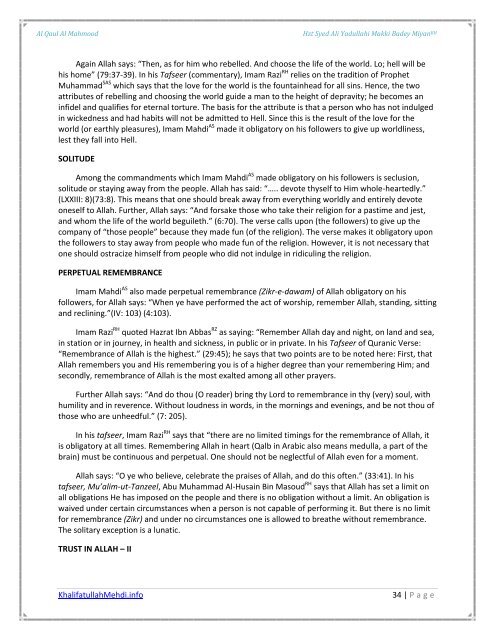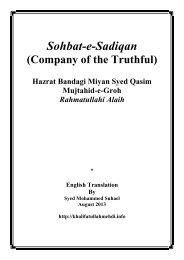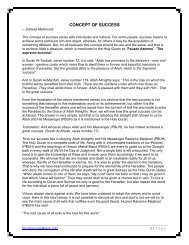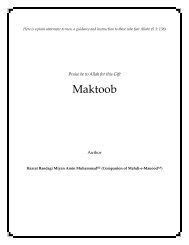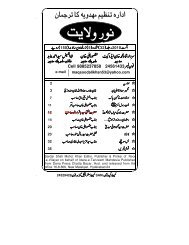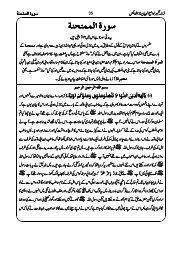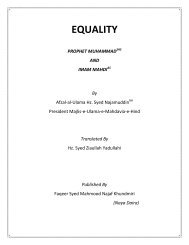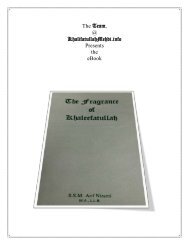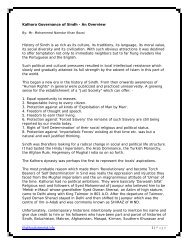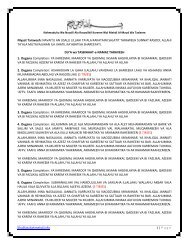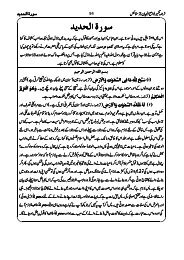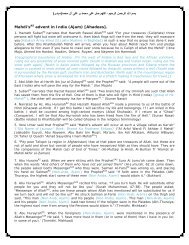Al-Qaul Al-Mahmood - Khalifatullah Mehdi
Al-Qaul Al-Mahmood - Khalifatullah Mehdi
Al-Qaul Al-Mahmood - Khalifatullah Mehdi
Create successful ePaper yourself
Turn your PDF publications into a flip-book with our unique Google optimized e-Paper software.
<strong>Al</strong> <strong>Qaul</strong> <strong>Al</strong> <strong>Mahmood</strong><br />
Hzt Syed <strong>Al</strong>i Yadullahi Makki Badey Miyan RH<br />
Again <strong>Al</strong>lah says: “Then, as for him who rebelled. And choose the life of the world. Lo; hell will be<br />
his home” (79:37-39). In his Tafseer (commentary), Imam Razi RH relies on the tradition of Prophet<br />
Muhammad SAS which says that the love for the world is the fountainhead for all sins. Hence, the two<br />
attributes of rebelling and choosing the world guide a man to the height of depravity; he becomes an<br />
infidel and qualifies for eternal torture. The basis for the attribute is that a person who has not indulged<br />
in wickedness and had habits will not be admitted to Hell. Since this is the result of the love for the<br />
world (or earthly pleasures), Imam Mahdi AS made it obligatory on his followers to give up worldliness,<br />
lest they fall into Hell.<br />
SOLITUDE<br />
Among the commandments which Imam Mahdi AS made obligatory on his followers is seclusion,<br />
solitude or staying away from the people. <strong>Al</strong>lah has said: “….. devote thyself to Him whole-heartedly.”<br />
(LXXIII: 8)(73:8). This means that one should break away from everything worldly and entirely devote<br />
oneself to <strong>Al</strong>lah. Further, <strong>Al</strong>lah says: “And forsake those who take their religion for a pastime and jest,<br />
and whom the life of the world beguileth.” (6:70). The verse calls upon (the followers) to give up the<br />
company of “those people” because they made fun (of the religion). The verse makes it obligatory upon<br />
the followers to stay away from people who made fun of the religion. However, it is not necessary that<br />
one should ostracize himself from people who did not indulge in ridiculing the religion.<br />
PERPETUAL REMEMBRANCE<br />
Imam Mahdi AS also made perpetual remembrance (Zikr-e-dawam) of <strong>Al</strong>lah obligatory on his<br />
followers, for <strong>Al</strong>lah says: “When ye have performed the act of worship, remember <strong>Al</strong>lah, standing, sitting<br />
and reclining.”(IV: 103) (4:103).<br />
Imam Razi RH quoted Hazrat Ibn Abbas RZ as saying: “Remember <strong>Al</strong>lah day and night, on land and sea,<br />
in station or in journey, in health and sickness, in public or in private. In his Tafseer of Quranic Verse:<br />
“Remembrance of <strong>Al</strong>lah is the highest.” (29:45); he says that two points are to be noted here: First, that<br />
<strong>Al</strong>lah remembers you and His remembering you is of a higher degree than your remembering Him; and<br />
secondly, remembrance of <strong>Al</strong>lah is the most exalted among all other prayers.<br />
Further <strong>Al</strong>lah says: “And do thou (O reader) bring thy Lord to remembrance in thy (very) soul, with<br />
humility and in reverence. Without loudness in words, in the mornings and evenings, and be not thou of<br />
those who are unheedful.” (7: 205).<br />
In his tafseer, Imam Razi RH says that “there are no limited timings for the remembrance of <strong>Al</strong>lah, it<br />
is obligatory at all times. Remembering <strong>Al</strong>lah in heart (Qalb in Arabic also means medulla, a part of the<br />
brain) must be continuous and perpetual. One should not be neglectful of <strong>Al</strong>lah even for a moment.<br />
<strong>Al</strong>lah says: “O ye who believe, celebrate the praises of <strong>Al</strong>lah, and do this often.” (33:41). In his<br />
tafseer, Mu’alim-ut-Tanzeel, Abu Muhammad <strong>Al</strong>-Husain Bin Masoud RH says that <strong>Al</strong>lah has set a limit on<br />
all obligations He has imposed on the people and there is no obligation without a limit. An obligation is<br />
waived under certain circumstances when a person is not capable of performing it. But there is no limit<br />
for remembrance (Zikr) and under no circumstances one is allowed to breathe without remembrance.<br />
The solitary exception is a lunatic.<br />
TRUST IN ALLAH – II<br />
<strong>Khalifatullah</strong><strong>Mehdi</strong>.info<br />
34 | P age


